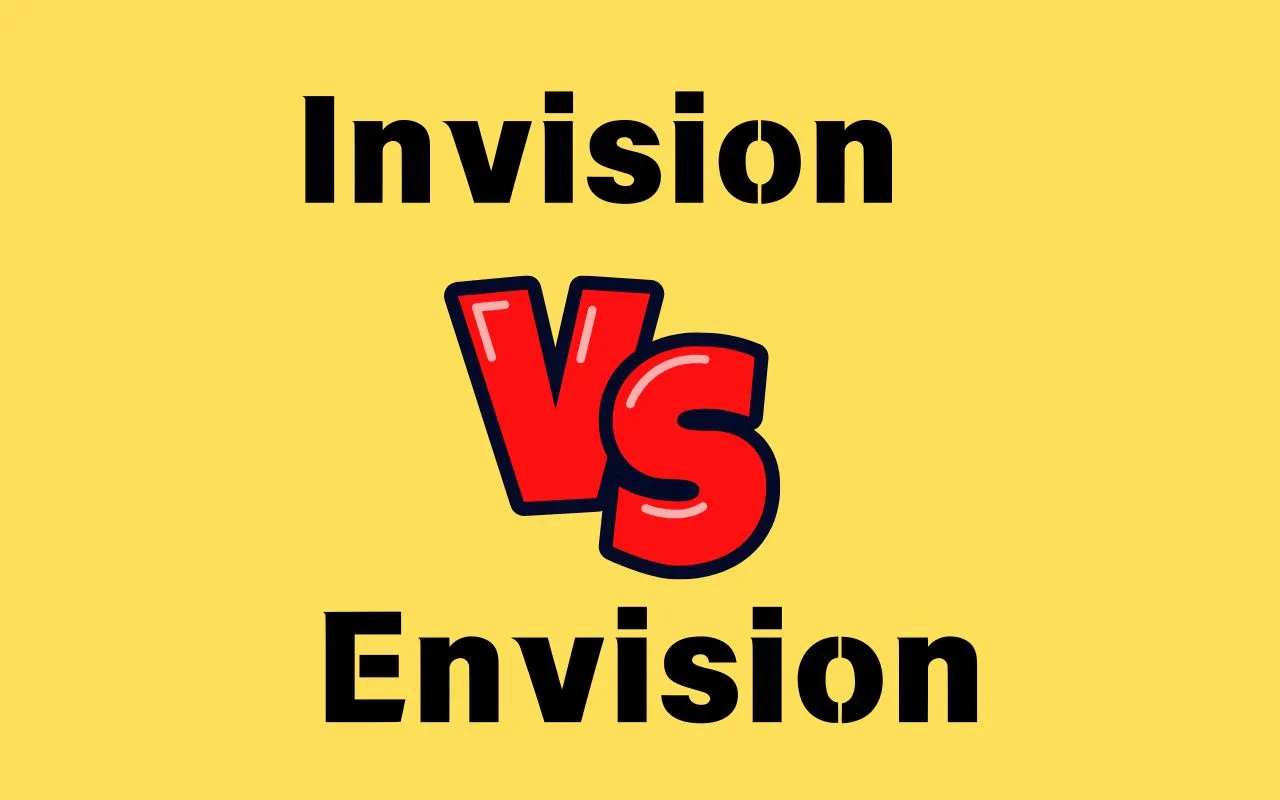Last updated on February 19th, 2025 at 01:42 pm
When it comes to choosing between “invision” and “envision,” you might feel a bit uncertain. While the words may seem interchangeable at first glance, one is the correct form while the other is a persistent misspelling.
Is it “invision” or “envision”? The answer is clear: “envision” is the correct word for imagining or visualizing something. Find out why!
Let’s explore the origins, meanings, and proper usage of “envision” and uncover why “invision” doesn’t belong in standard English.
Understanding the Common Confusion Between Invision and Envision
It’s easy to see why people confuse invision and envision. The prefixes “in-” and “en-” are phonetically similar, which can cause uncertainty in spelling, especially when typing quickly or relying on autocorrect.
The confusion is further compounded by the influence of related words like invisible or invite, which share the prefix “in-.” However, envision is the only correct term in English for imagining or visualizing something in your mind.
The Origin and Evolution of the Word “Envision”
The word envision traces its roots back to the French word envisager, meaning “to consider or contemplate.”
It first appeared in English during the late 19th century, derived from the prefix en- (meaning “in” or “within”) and the Latin word visionem (meaning “sight” or “vision”).
Initially used in philosophical and literary contexts, envision grew in popularity as a way to express imaginative foresight, such as planning for the future or visualizing abstract concepts.
From Old Spellings to Modern Usage
In early English texts, words with the prefix “en-” often appeared in variant spellings like “in-” due to inconsistent standardization in spelling. For example:
- Enquire and inquire were used interchangeably for centuries.
- Similarly, older spellings of words like envision sometimes appeared as invision, particularly in unstandardized texts.
However, with the development of modern dictionaries and linguistic rules, envision became the established spelling, while invision was relegated to the status of a misspelling.
How Language Evolution Affects Spelling
Language constantly evolves, and spelling norms often shift over time. The persistence of invision as a misspelling can be attributed to:
- Phonetic Similarity: The “en-” prefix sounds nearly identical to “in-” in spoken English.
- Influence of Other Words: Words like invisible or invention may subconsciously lead people to write invision.
- Autocorrect Errors: Autocorrect may not always flag invision as incorrect, especially if it’s part of a name or brand (e.g., “InVision” design software).
Despite these factors, envision remains the only correct form when referring to imagining or visualizing something.
Correct Usage of Envision in American and British English
Both American and British English recognize envision as the standard spelling. Here’s how it’s used in various contexts:
- American English:
- “The CEO envisions a future where renewable energy is the norm.”
- British English:
- “She envisions a world without poverty and inequality.”
While spelling differences often exist between American and British English (e.g., color vs. colour), envision is consistent across both dialects.
Envision vs Invision: Clarity on Proper Spelling

To avoid confusion, remember this simple rule: Always use “envision” when referring to imagining or visualizing.
Quick Comparison Table
| Word | Correct Spelling? | Meaning | Example Usage |
|---|---|---|---|
| Envision | ✅ Yes | To imagine or visualize | “She envisions herself achieving her dreams.” |
| Invision | ❌ No | Not a valid word in standard English | N/A |
Envision is the only correct term in English. Any use of invision is either a typo or an intentional usage in a brand name or proprietary context (e.g., InVision software).
Why Invision Is a Persistent Misspelling
The prevalence of invision as a misspelling stems from both linguistic and technological factors:
- Brand Influence: Companies like InVision (a popular design collaboration platform) have popularized the non-standard spelling, leading to accidental use in unrelated contexts.
- Lack of Awareness: Many people are unaware that invision isn’t an actual word in English.
- Typing Errors: The proximity of “i” and “e” on a keyboard often results in typographical errors.
To avoid mistakes, double-check your spelling and consider using grammar tools like Grammarly or Microsoft Editor for professional writing.
Expanding Your Vocabulary: Synonyms and Usage of Envision
Expanding your vocabulary can help you avoid overusing envision. Here are some synonyms and examples of how to use them:
Synonyms for Envision
- Imagine: “Can you imagine a world without technology?”
- Visualize: “The artist visualized the final painting before starting.”
- Foresee: “Economists foresee a rise in global temperatures over the next decade.”
- Conceive: “She conceived a groundbreaking idea for the new project.”
- Dream up: “They dreamed up an innovative solution to the problem.”
Example Sentences
- “He envisions a life filled with success and happiness.”
- “Try to visualize the steps you need to achieve your goals.”
- “The architect conceived a futuristic design for the new building.”
By varying your word choice, you can keep your writing dynamic and engaging.
FAQs
What is the correct spelling: invision or envision?
The correct spelling is “envision.” The term “invision” is a misspelling in standard English.
What does “envision” mean?
“Envision” means to imagine or visualize something, often related to future possibilities or abstract ideas.
Why is “invision” incorrect?
“Invision” is not a standard English word. Its prevalence is mainly due to brand names like “InVision” software.
Are “envision” and “imagine” synonyms?
Yes, “envision” and “imagine” are synonyms, but “envision” often implies a clearer or more purposeful visualization.
How can I avoid misspelling “envision”?
To avoid errors, remember that “envision” starts with “en-” like “enable” or “enhance,” and always proofread your writing.
Conclusion
When it comes to “invision” vs. “envision,” there’s no contest: envision is the correct choice in English.
Understanding the historical origins, proper usage, and common mistakes will help you communicate more effectively and avoid common errors.
Whether you’re writing an essay, a business proposal, or simply texting a friend, keep this guide in mind to ensure your writing remains polished and professional.
